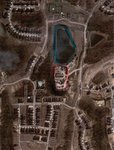




PITTSBORO — Following the North Carolina Utilities Commission’s decision late last month to delay a decision on a proposed transfer of wastewater systems, residents of both Briar Chapel and Fearrington Village are waiting on their sewage’s future.
The Old North State Water Company, based in Raleigh, had filed for a transfer of Fearrington Village’s wastewater to the company’s current facility in Briar Chapel. But after a notice to customers in October 2019 and the transfer of power of Briar Chapel’s homeowners association from the developer to residents — and more than 600 names on a petition — the transfer has been halted.
It’s a process that started in late 2017 that has reached a standstill and affects more than 3,200 residential customers, representing thousands of Chatham County residents in two of the county’s largest developments that sit just a mile apart along U.S. Highway 15-501.
The need for change
Both Briar Chapel and Fearrington Village have their own wastewater management and cleaning systems, meaning their residents are not part of Chatham County or the Town of Pittsboro’s systems. But concerns were raised about the state of the Fearrington Village plant. According to documents filed with the North Carolina Utilities Commission (NCUC) — which oversees all utility transfers, purchases and rates across the state — the Fearrington plant is “aging.”
In testimony given on Dec. 4, 2019, ONSWC President Michael Myers said the Fearrington plant is currently 35 years old, the early stages of its expected lifespan, and “will need to be completely replaced, including material treatment upgrades, to meet upcoming nutrient management requirements for discharge into the Jordan Lake watershed.” This year marks the beginning of implementation of new rules for limiting the amount of nutrients allowed to be moved into Jordan Lake.
As a solution, Myers said, the ONSWC plant in Briar Chapel would take on the whole of Fearrington Village’s wastewater by constructing a pump station — an operation that directs water in a new direction — to get the wastewater to Briar Chapel. The plant now receiving the water would receive an expansion from handling one-quarter of a million gallons of wastewater per day to one million gallons per day and “serve as a regional WWTP to treat the wastewater for future build-outs of Briar Chapel and Fearrington Village, and other nearby developments.” The plant would also be given a more than $10 million upgrade to utilize membrane bioreactor (MBR)-treated effluent, which Myers said would “provide significant and meaningful benefit to the environment.”
Additionally, the ONSWC efforts in Briar Chapel would be transferred to a new operation called Old North State Water Company - Chatham North, also with Michael Myers at the helm.
Testimony on the same day as Myers from Robert Burgin, a South Carolina-based engineer who spoke on behalf of Chatham North, cited the new treatment plan as beneficial to the environment as well as odor control measures. Additionally, the plant’s expansion would not enlarge its footprint in the development.
“In particular, the initial screen will be enclosed, the equalization basin will be covered and air will be pulled through each unit and passed to an air scrubber,” Burgin said in his testimony. “The odor-emitting particles will be retained on the media or broken down biologically to inert compounds that do not have odors associated with them.”
Myers also stated that the “larger customer base” would “help to minimize the impact of inflationary pressures on a per customer basis.” In conclusion, he said the transfer and expanded plant would only make things better in Briar Chapel.
“The combined wastewater system will enable greater flexibility for management of the reclaimed water,” he said. “It will reduce Briar Chapel’s dependency on the spray irrigation system and allow for better management of the reclaimed water disposal system.”
And initially, the NCUC’s Public Staff division felt the plan was solid.
“The transfer of both of these systems to Chatham North and the plan to consolidate the systems into one expanded BC WWTP should reduce the per customer rate base and operating expenses to provide safe and reliable wastewater utility service,” Charles Junis, an engineer in the Water, Sewer and Telephone Division of the NCUC, said in a December 20 testimony. “The MBR technology, when designed, constructed, operated and maintained correctly, produces higher quality effluent that can reduce nutrient loading rates to meet stringent NPDES (National Pollutant Discharge Elimination System) permit limits and/or delay the need for additional irrigation areas.”
Residents skeptical
But ONSWC hasn’t had a perfect record in managing the wastewater it’s currently responsible for in Briar Chapel.
The company, which has overseen wastewater operations in the development since 2015, has received two letters of violation from the N.C. Department of Environmental Quality — one in October 2017 for a “pipe failure” on Hillcreek Boulevard and another in August 2019 for three separate incidents. In total, those spills accounted for 4,000 gallons of raw sewage, and ONSWC received an $11,000 fine. A settlement led to the penalty being just more than $7,700.
Additionally, the Chatham County Watershed Protection Department fined ONSWC $15,050 for “continued violations of the Chatham County Soil Erosion and Sedimentation Control Ordinance.” In a letter addressed to Myers, Watershed Protection Director Rachael Thorn wrote that the company had taken part in “land-disturbing activities beyond the approved limits of disturbance” — particularly in depositing off-site sediment onto Briar Chapel Parkway, enacting damage to private property and poor installation of erosion and sediment control, leading to sediment deposit on the alley behind the development’s tennis courts.
Citing these violations and other complaints, Briar Chapel residents showed up in written statements, signed petitions and in-person testimony to the NCUC asking the Commission to deny the transfer.
One major complaint was the nature of ONSWC’s response to customer complaints. Patricia Van Hoy, who lives in the Encore section of Briar Chapel, wrote in a December 10 statement that Envirolink — the wastewater management company of which Michael Myers also serves as president that oversees day-to-day operations of the Briar Chapel plant — “ignore(s) the call” when “contacted regarding issues with the irrigation system.”
“At least once a week a call is made to Envirolink, contractor for ONS, about excessive noise and odor from the plant,” Van Hoy wrote. “When I called Saturday, November 30, I was told, ‘We don’t have anyone on duty on the weekends.’ The odor was so strong, you couldn’t go outside. This is a regular occurrence and we were told that a new carbon filter would correct this problem. Well, it didn’t.”
John DiMiceli and Josephine Corro signed a letter to NCUC saying ONSWC and Envirolink’s entry into Briar Chapel’s wastewater system initiated problems that had not previously existed.
“Their management of the current plant has earned them nothing but dissatisfaction, opposition and concern from the community,” DiMecli and Corro wrote. “One of our concerns is for the quality of our lives here in Briar Chapel, and that when we, and others in (the) community, put our homes on the market their value will be diminished due to problems with the (proposed) sewage treatment facility.”
More citizens expressed their concerns during a January 14 public meeting at the Chatham County Historic Courthouse in Pittsboro. Tom Speer, the president of the Briar Chapel Community Association, said during his testimony that the BCCA’s board of directors has “assess(ed) property damages and costs...into the 100s of thousands of dollars.”
“ONS gave verbal commitments to official transition committee members of Briar Chapel and stated that they would replace damaged vegetation and trees,” Speer said. “To date considerable work remains to finalize grading, replace destroyed sidewalk, replant trees and restore vegetation banners.”
Additionally, customers complained of waking up to “a strong, rotten-egg like odor in my house” and “routine over-spraying of ‘gray water.’”
A change of position
Perhaps most notably, the Public Staff of the NCUC has made nearly a complete 180-degree turn in its public opinions of ONSWC’s handling of its current operations and cast doubt on its ability to handle a new influx of wastewater.
In a January 21 motion to reschedule the second public hearing on the transfer, planned for the next day, Public Staff asked for a delay, citing the need to see ONSWC “develop and successfully implement the necessary equipment improvements and improved maintenance and operating procedures” to reduce the impact the current Briar Chapel plant had made on nearby residents.
The motion also backed up claims made by many of the residents, particularly in the Encore neighborhood, which is next door to the plant. The area is designed to house residents aged 55 and over and provides a clubhouse and swimming pool. The motion stated the staff — specifically Junis and Public Staff attorney William Grantmyre — had “observe(d) sewage odors while standing at the Encore swim club/clubhouse” during a January 18 visit to the neighborhood with Speer.
“We were advised the sewage odors are much worse in warmer weather restricting the use of the swim club/clubhouse facilities,” the Public Staff motion said. “It was clear that customers that purchased these houses, due to the various access streets, could have been totally unaware of the nearby WWTP when they purchased their homes.”
The location of the irrigation systems utilizing reclaimed water was scrutinized, with staff saying it was “different from the overwhelming majority of Commission regulated wastewater systems utilizing reclaimed water.” Other systems will spray the water on golf courses or another field “away from the customer residents,” but Briar Chapel’s, according to staff, “is permitted and sprayed throughout this extremely large development along roadways, road medians, walking and riding trails, and in some customer’s yards.” The motion said Public Staff had not received the same “extensive odor complaints” from other NCUC-permitted reclaimed water systems, “including the one or possibly two that irrigate reclaimed water near houses.”
Public Staff also expressed concerns about the MBR technology, saying it was “relatively new” and that the “odor control methods need(ed) to be thoroughly investigated.” Additionally, the organization has “very limited experience with the maintenance and operation” of MBR plants.
Public Staff had given the OK to the transfer in Junis’ testimony in mid-December, and the January 21 motion said the BCCA had not contacted staff or sought to intervene, so “the Public Staff assumed the BCCA did not have major concerns,” the motion said. But the neighborhood’s developer had “controlled” the BCCA until late November, and complaints from the BCCA were lodged after that transition, but too late for the December 27 deadline to intervene.
Editor’s Note: Next week, the News + Record will have a follow-up report after reaching out to the Briar Chapel Community Association, Old North State Water Company, Newland Communities, the North Carolina Utilities Commission and Fearrington Village.
Reporter Zachary Horner can be reached at zhorner@chathamnr.com or on Twitter at @ZachHornerCNR.